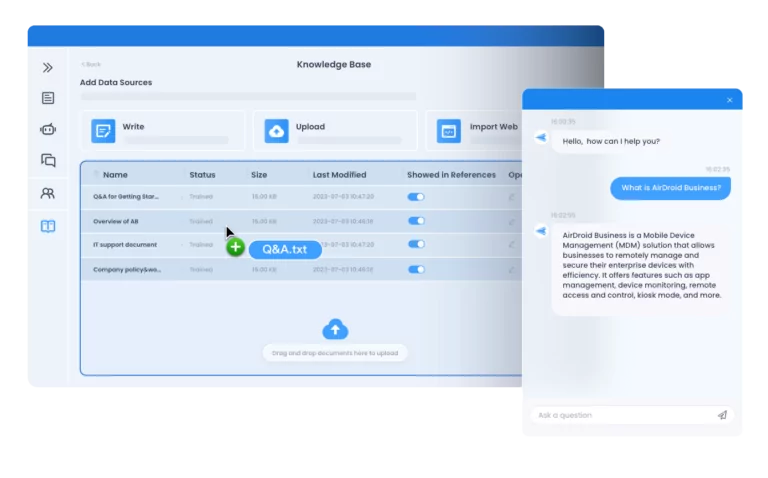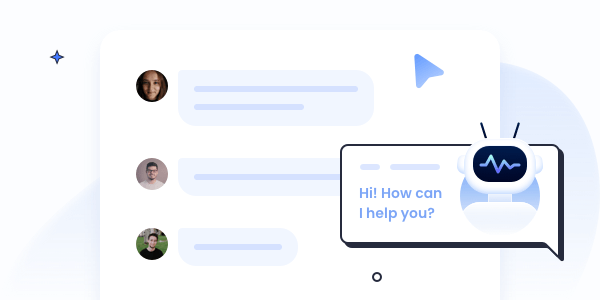Leveraging AI Chatbot for Business to Boost Efficiency
AI chatbots for businesses have truly evolved in recent times, considering their capabilities, scope, and complexity. These chatbots are interactive and sophisticated solutions whose abilities are owed to natural language understanding and machine learning advancements.
With their utilization in different industries and fields, AI chatbots have become significant business tools. This article is a quick sneak into the number of ways in which AI chatbots can prove to be beneficial for businesses, both small and large-scale ones.
Part 1: Types of AI Chatbots to Assist in Business
A chatbot powered by artificial intelligence (AI) is a software application that replicates human discussions with users via text or speech. When a user provides a prompt, the chatbot uses AI technology to interpret the user's input, process information, and generate a suitable answer to assist the user in completing tasks or obtaining information.
1. Rule-based chatbots
These are analogous to the fundamental building blocks of a corporate strategy—consistent and dependable. Many firms, for example, use them for preliminary lead generation, providing prepared responses. Yellow.ai seamlessly incorporates this paradigm, providing quick customer interactions.
2. Keyword recognition-based chatbots
Consider a careful analyst who spots patterns and trends. These chatbots identify important terms in a conversation and provide more nuanced responses, similar to how Yellow.ai's chatbots parse user inputs to provide contextually relevant responses.
3. Menu-based chatbots
These chatbots simplify user experiences with preset menus, similar to how an ATM machine guides you through options. They're especially useful in e-commerce environments, as they help users navigate from product queries to checkout.
4. Contextual chatbots (Intelligent chatbots)
These are the chatbot world's strategic consultants. These chatbots remember your preferences based on previous encounters, similar to Yellow.ai's platform, which uses AI to create personalized experiences, making user interactions authentic and timely. These are ideal for firms looking for in-depth client involvement because they are equipped with NLP and machine learning.
5. Hybrid chatbots
Consider them your integrated business suites, which combine the advantages of several formats. Yellow.ai's platform exemplifies this adaptability, supporting both organized and AI-driven interactions.
6. Voice-enabled chatbots
A voice bot is a software that uses Artificial Intelligence, enabling it to converse with incoming calls. Machine learning and natural language processing interpret, capture, and evaluate a user’s vocal input and answer them through voice.
Part 2: Benefits of AI Chatbots for Business
Chatbot technology can achieve a lot other than simply answering questions. Now, they can offer support in several languages, score leads, and instantly direct conversations toward human representatives if need be. Therefore, the benefits of AI chatbots for businesses are truly endless. However, there are a few that truly stand out.
1 Improved Customer Service
Customer service teams at different companies can save a significant amount of time by automating manual tasks. This allows the teams to focus on more meaningful tasks.
For instance, various companies implement chatbots on their websites to respond to inquiries. This way, their custom service teams can instantly solve commonly faced issues. As a result, they are able to save up a large number of support hours in the first six months after implementing chatbots.
Adding these AI chatbots can also help businesses respond to customer queries more efficiently and accurately and deflect traffic away from the customer services team. Moreover, customers can be instantly directed towards FAQs, sizing charts, return portals, registrations for live webinars, and tutorial videos, ensuring that the customers get five-starred service at all times.
2 Cost Efficiency
AI chatbots also significantly reduce costs for businesses by automating responses to frequently asked questions and common operations. Thereby, the human agents are able to concentrate more on valuable and more complex jobs.
3 Scalability and Flexibility
The best aspect of using AI chatbots in businesses is that they can handle a large volume of interactions that can be easily scaled to meet the customers’ changing demands.
This means that companies can now quickly respond to any noticeable changes in customer behavior, ensuring they have the resources and support they need to meet their customers’ needs.
4 Personalization
Personalization is a key driver when it comes to loyalty and customer satisfaction. AI chatbots are able to utilize customer data to address certain needs and anticipate them, resulting in tailored solutions and recommendations. These bots are able to analyze large amounts of consumer data, such as their purchase history, browsing behavior, and preferences.
They deliver personalized recommendations to the customers based on this data. By tailoring their interactions to individual preferences and needs, companies can create a meaningful and more personal connection with their clientele.
Part 3: Uses Cases of AI Chatbots in Different Industries
AI chatbots have expanded their use in many different industries and are quickly becoming an essential tool. Here is how these bots are being used around a variety of fields.
1 Retail
Chatbots in retail act as automated shopping assistants that can respond to different queries presented by customers. Not only this, but they can also upsell products, provide personalized recommendations, and give promo codes. They are specifically designed to drive sales and improve customer experience in the retail sector.
2 Healthcare
Medical facilities tend to become expensive when it comes to ensuring patients get their designated time with the doctors, as it also involves balancing costs. Healthcare chatbots can provide initial triage and basic health advice, helping users determine whether they need to seek immediate medical attention. They can also assist in scheduling appointments, providing medication reminders, and offering general information about healthcare services.
3 Banking and Finance
Chatbots can handle basic banking inquiries, such as checking account balances, transaction history, and assistance with money transfers. They can also provide information on financial products, help users find a nearby ATM, or even guide them through the process of opening a new account.
4 Human Resources
Chatbots can assist employees with various HR-related tasks, such as accessing employee benefits information, submitting time-off requests, or obtaining company policies and procedures. They can also provide onboarding support for new hires.
5 E-commerce
Chatbots can help customers with product recommendations based on their preferences and previous purchases. They can also assist in placing orders, processing payments, and resolving any issues related to online shopping.
6 Customer Service
AI chatbots can handle customer inquiries, provide support, and answer frequently asked questions. They can assist customers in various areas such as order tracking, product information, and troubleshooting common issues.
Part 4: What to Consider when Choosing an AI Chatbot for Business?
If you want to use AI chatbots to help your ecommerce business, here are some things to think about as you start researching your options:
1. Identify your needs and goals
Before you begin your search, decide what you want your AI chatbot to accomplish. Do you want to improve customer service, generate more leads, or optimize internal processes? Having specific goals will help you limit down your selections and choose chatbot software that meets your requirements.
2. Consider cost, time, and resources needed
Implementing an AI chatbot requires an investment of financial resources, time, and manpower. It's important to consider the upfront and ongoing costs associated with developing, deploying, and maintaining the chatbot. Additionally, evaluate the time and resources required for training and managing the chatbot.
3. Understand security and compliance
Chatbots are responsible for handling sensitive customer information, so security and compliance are paramount. Ensure that the chatbot solution you choose follows industry best practices for data protection, encryption, and secure communication. It should also comply with applicable regulations, such as GDPR or HIPAA, depending on your industry.
4. Check integrations
Integrations allow for smooth communication and data transfer between the chatbot and other corporate systems in order to provide a consistent customer experience, expedite workflows, and improve overall efficiency—however, not all bots can be integrated across all systems or platforms. Check that your AI chatbot can be integrated with the systems you require.
5. Evaluate the Natural Language Processing
NLP is the technology that enables chatbots to understand and interpret human language. Assess the NLP capabilities of the chatbot, including its ability to accurately understand user queries and provide appropriate responses. Look for features such as sentiment analysis, entity recognition, and context awareness to enhance the chatbot's performance.
6. Test and evaluate user experience
Before finalizing a chatbot solution, it's important to thoroughly test the user experience. Ensure that the chatbot is able to handle a wide range of user queries effectively and provide relevant and helpful responses. User feedback and evaluation can help identify areas for improvement and ensure that the chatbot meets your company's specific user experience requirements.
Part 5: Scaling Business Support with ChatInsight AI
Scaling is a business that involves setting the stage to support and enable growth for your company. There are different tools that can help enterprises to achieve that. It is where a platform like ChatInsight AI can help do wonders for the business with its extensive knowledge base.
You can customize this tool according to your business’s specific needs. Moreover, it can also help you centralize knowledge and data by scaling up your internal and external support capabilities. It can efficiently train the chatbot using the provided custom inputs, making it much easier to deliver accurate responses.

Why Choose ChatInsight AI for Businesses?
- 24/7 Availability: It helps besinesses provide support for millions of conversations 24/7/365 instantly with less training.
- Cost Reduction: Automating customer support through chatbots can reduce operational costs. Businesses can handle a larger volume of inquiries without increasing the size of their support team, leading to cost savings.
- Better Customer Experience: It provides more accurate and helpful responses to user queries, reducing frustration and increasing satisfaction.
- Multichannel Support: This enables businesses to provide support across multiple platforms, easily integrate from the website to the app.
Conclusion
Smart decisions today begin with AI. Chatbots built on artificial intelligence tend to enhance the experiences of both consumers and businesses. Customers always love a personal touch to their conversations, but it is always comforting for them to know that there is someone always available when it comes to immediately responding to their queries.
The benefits of attaching chatbots for businesses to customer service are quite endless. It would be best to stay informed about the upcoming AI chatbot advancements in the business field to take full advantage of their capabilities, therefore enhancing consumer satisfaction.




Leave a Reply.